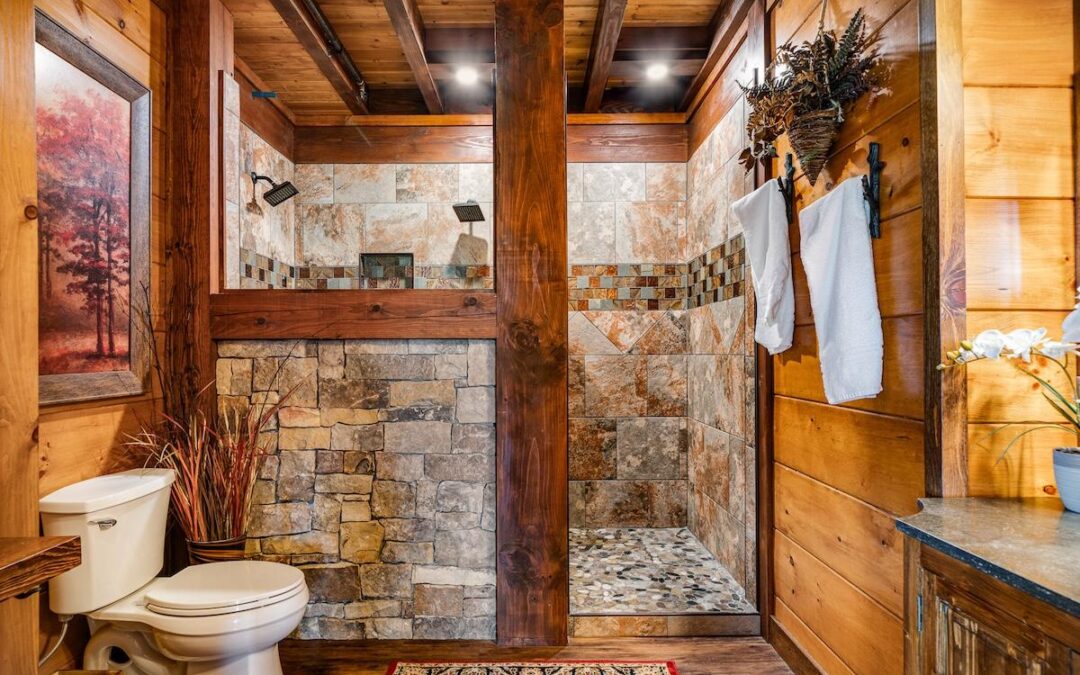Bathrooms have become small spas and sanctuaries in many log cabins and log homes. The flooring in a bath space has also evolved. Here are some thoughts from the Honest Abe Log Home design team:
Bathroom Flooring Options
- Ceramic tile: Ceramic tile is a popular choice for bathroom flooring because it is durable, water-resistant, and easy to clean. It also comes in a wide variety of colors and designs. However, ceramic tiles can be cold underfoot and slippery when wet.
- Vinyl tile: Vinyl tile is a budget-friendly option for bathroom flooring. It is also water-resistant and easy to clean. However, it may not be as durable as ceramic tile and it is not as warm as other materials.
- Porcelain tile: Porcelain tile is a type of ceramic tile, but it is denser and more water-resistant than regular ceramic tile. It can also withstand higher temperatures. The downside is it may be more expensive than ceramic tile, and in certain cases, harder to install.
- Natural stone: Natural stone, such as slate or marble, can add a luxurious feel to a bathroom. It is durable and water-resistant, but it can be cold underfoot and may be more expensive than other options. It also requires regular maintenance.
- Laminate flooring: Laminate flooring is a budget-friendly option that can mimic the look of hardwood or stone. It is also water-resistant, but not as much as other options and it can be less durable than other materials.
- Hardwood flooring: Hardwood flooring is not a good option for bathrooms because wood is not water-resistant and it can warp or rot when exposed to moisture.

Shower Flooring Options
- Ceramic tile: Ceramic tile is a popular choice for shower flooring because it is durable, water-resistant, and easy to clean. It also comes in a wide variety of colors and designs. However, ceramic tile can be slippery when wet, so it is important to choose a tile with a textured surface or to install a non-slip coating.
- Porcelain tile: Porcelain tile is a type of ceramic tile, but it is denser and more water-resistant than regular ceramic tile. It can also withstand higher temperatures. The downsides are it may be more expensive than ceramic tile and in certain cases harder to install.
- Natural stone: Natural stone, such as slate or marble, can add a luxurious feel to a shower. It is durable and water-resistant, but it can be cold underfoot and may be more expensive than other options. It also requires regular maintenance.
- Pebble tile: Pebble tile is a unique option that can give a spa-like feel to a shower. It is made of small pebbles attached to a mesh backing, which can be adhered to the shower floor. It is slip-resistant and easy to clean, but it may be more difficult to install than other options.
- Fiberglass: Fiberglass is a cost-effective and easy to install option, but it’s not as durable as tile and can become yellowed over time.
- Solid surface: Solid surface materials like Corian, Avonite, and Swanstone can be made to match the shower walls and can be used as a one-piece pan. It’s not as common as tile, but it’s easy to clean, and durable. But it’s not as customizable as tile.

Additional Considerations
- Slip resistance: When choosing bathroom flooring, it is important to consider slip resistance, especially in areas where water is likely to be present, such as the shower and around the bathtub.
- Durability: Bathroom flooring should be durable enough to withstand heavy traffic and wear and tear.
- Ease of maintenance: Bathroom flooring should be easy to clean and maintain.
- Budget: Bathroom flooring can range in price from budget-friendly to high-end. It is important to set a budget before you start shopping.

There are a variety of bathroom flooring options available, each with its own advantages and disadvantages. When choosing bathroom flooring, it is important to consider factors such as slip resistance, durability, ease of maintenance, and budget. Talk with your sales rep or independent dealer to make sure your bathroom floors are exactly what you need.
© 2023, Honest Abe Log Homes





